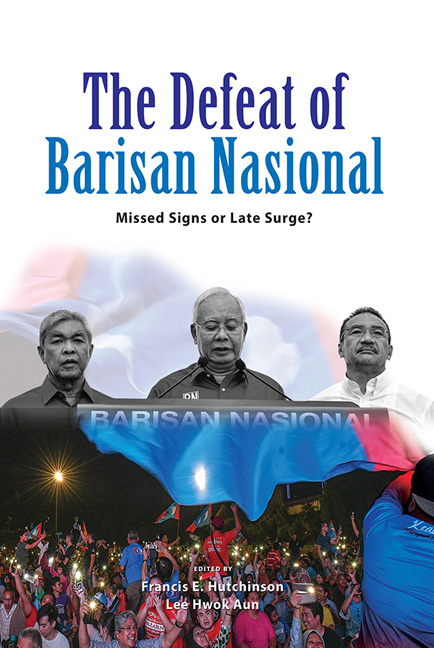16 - Sabah: the End of BN and a New Order?
Published online by Cambridge University Press: 17 April 2020
Summary
INTRODUCTION
The 14th General Elections (GE-14) that took place on 9 May 2018 was a significant moment in Malaysia's political history. Against expectations, Pakatan Harapan (PH) defeated Barisan Nasional (BN), thus ending the ruling coalition's dominance after sixty years in power at the federal level.
Sabah, along with Sarawak, had long been seen as Barisan Nasional's “fixed deposit”—states which could be relied upon to deliver large numbers of parliamentary seats. Yet, 2018 was the beginning of a new era in Sabah as, against expectations, a significant proportion of voters supported PH and the newly minted Sabah-based party Warisan. Consequently, BN netted a surprisingly low number of parliamentary seats and the state legislative assembly was evenly split. Following a period of uncertainty, PH, Warisan, and a third party, United Pasokmomogun Kadazandusun Organization (UPKO), secured a majority in the state legislative assembly and formed the state government—constituting a major departure from previous elections.
This chapter traces the GE-14 electoral process in Sabah, analyses key trends and junctures, and then examines the aftermath of this historic election. While the rise of Warisan was largely unexpected, as was the swing against Barisan, various conditions had been building up for such a dramatic shift. The current configuration, including the collapse of BN in Sabah and the emergence of a new state administration, poses important questions for the Kadazandusun, the state's largest ethnic group, and their political preferences.
To this end, this chapter is comprised of six sections. Following this introduction, the second section provides basic contextual information on Sabah, comparing and contrasting it with the situation in Peninsular Malaysia. The subsequent section looks at the lead up to GE-14 in the state, particularly how the various coalitions formed and what issues they sought to highlight. The fourth section looks at the election results at the parliamentary and state levels. The fifth analyses the aftermath of GE-14 in Sabah, and the sixth and final section concludes and looks forward.
CONTEXT
Sabah is one of the thirteen states in Malaysia and one of the country's most ethnically diverse. There are more than forty ethnic and subethnic groups in the state. The Kadazandusun is the largest ethnic group, constituting about 25 per cent of Sabah's population, followed by: Bajau (20 per cent); Chinese (13 per cent); Malay (8 per cent); and Murut (4.5 per cent).
- Type
- Chapter
- Information
- The Defeat of Barisan NasionalMissed Signs or Late Surge?, pp. 402 - 422Publisher: ISEAS–Yusof Ishak InstitutePrint publication year: 2019

